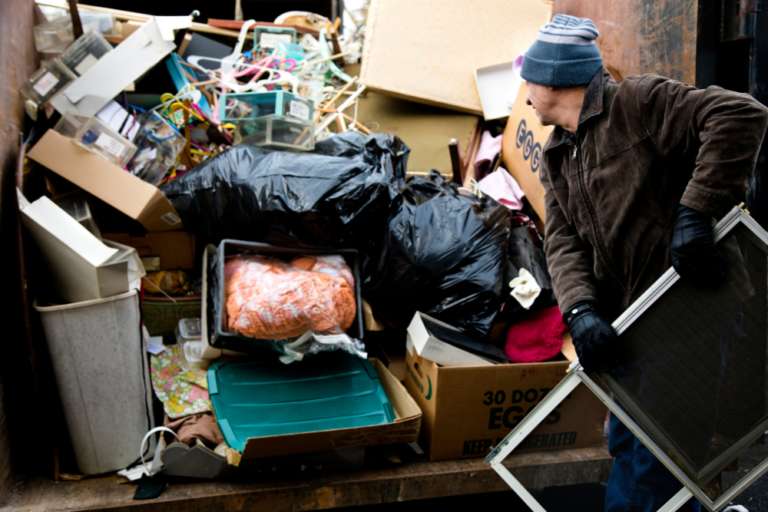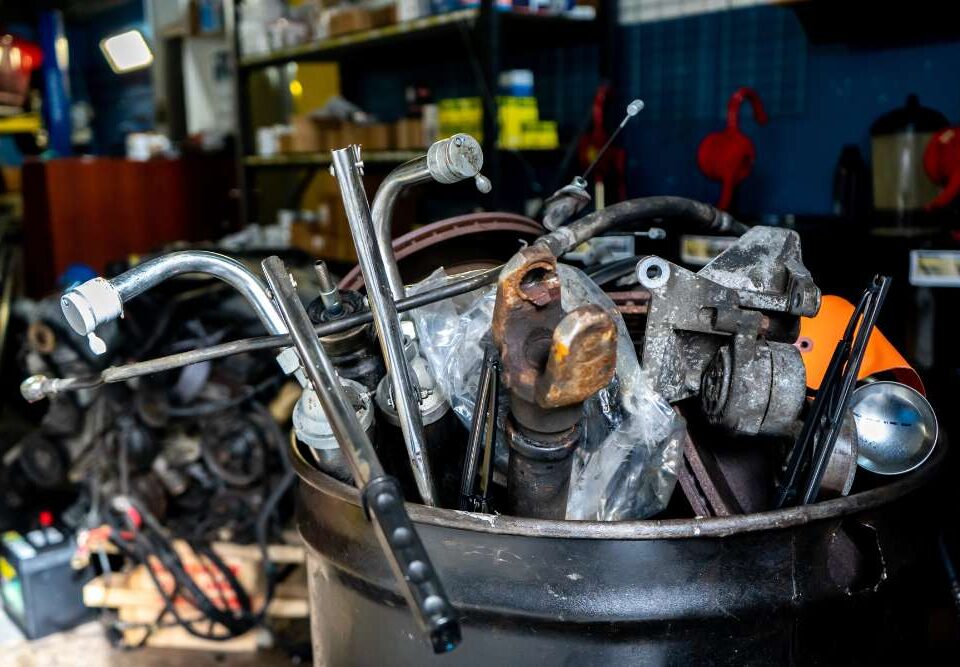
How Scrap Metal Removal Can Boost Your Eco-Friendly Efforts
September 23, 2025
The Environmental Impact of Improper Junk Disposal and How to Avoid It
September 23, 2025The Essential Guide to E-Waste Disposal for Businesses
In today’s fast-paced business environment, technology evolves faster than most companies can keep up with. Outdated computers, broken printers, and unused office electronics often pile up in storage rooms until the clutter becomes unmanageable. But improper disposal of these devices carries serious environmental risks, from toxic chemicals contaminating soil to harmful emissions entering the atmosphere. Businesses face not only sustainability challenges but also compliance obligations when managing e-waste. By understanding proper disposal methods and embracing eco-friendly solutions, organizations can protect the planet while maintaining efficiency. This essential guide explores how businesses can handle e-waste responsibly and sustainably for long-term benefits.
Understanding the meaning of e waste in the workplace
E waste refers to discarded electrical or electronic equipment, including computers, phones, monitors, and office machinery. In a workplace, this can accumulate quickly as companies upgrade technology to stay competitive. Unfortunately, many businesses are unaware of the risks tied to piling up unused devices. Old electronics often contain hazardous elements such as lead, mercury, and cadmium. When thrown in landfills, these materials leach into the soil and contaminate groundwater. The environmental cost of neglecting proper e waste management can be severe, impacting ecosystems and public health.
For businesses, recognizing the scope of e waste is the first step toward responsible management. By labeling outdated electronics as recyclable resources rather than disposable trash, companies shift their perspective. E waste contains valuable metals like gold, copper, and aluminum that can be recovered through proper recycling. Understanding its dual nature—both hazardous and resource-rich—empowers businesses to manage waste more sustainably, benefiting both operations and the environment.

Why proper e waste disposal matters for businesses
For businesses, proper e waste disposal goes far beyond environmental responsibility. Organizations must also consider data security, compliance with local regulations, and their overall reputation. When old electronics are tossed carelessly, sensitive data can be left behind, creating cybersecurity risks. Similarly, failing to follow disposal laws can result in costly penalties. These issues highlight why simply throwing away outdated equipment is not an option.
Proper e waste disposal helps businesses demonstrate accountability and corporate responsibility. Clients and stakeholders often prefer working with companies that align with sustainable practices. By disposing of electronics through certified recycling channels, businesses protect their brand image while reducing their ecological footprint. Additionally, responsible e waste management can free up office space and improve efficiency. For modern companies, making disposal a structured part of operations is no longer optional but an essential aspect of business continuity and growth.
The environmental consequences of ignoring e waste
Improper e waste disposal is a growing concern because of its toxic impact on the planet. Electronics contain chemicals that, when exposed to heat, moisture, or decomposition, release dangerous pollutants. Lead and mercury seep into soil and water systems, harming wildlife and disrupting ecosystems. Burning or landfilling e waste also produces greenhouse gases that intensify climate change. The long-term consequences extend beyond nature, ultimately affecting human health through contaminated air and water supplies.
For businesses, overlooking these effects not only damages the environment but also contradicts sustainability goals. Organizations that ignore responsible practices contribute to landfill overflow and pollution. On the other hand, embracing eco-friendly e waste disposal reduces greenhouse gas emissions, conserves resources, and safeguards natural habitats. Recognizing the environmental stakes allows businesses to take informed action. Proper disposal is not just a green initiative—it is a critical defense against lasting ecological damage caused by neglect.
How recycling e waste benefits businesses
Recycling e waste transforms a challenge into an opportunity. Instead of allowing electronics to deteriorate in landfills, businesses can recycle them to recover valuable materials. Metals such as gold, silver, and copper can be extracted and reused, reducing the demand for mining raw resources. Recycling lowers operational costs in the long run, as many disposal companies provide rebates or incentives for large volumes of recyclable materials.
Beyond financial savings, recycling helps businesses align with sustainability commitments. It reduces the organization’s carbon footprint and supports a circular economy where materials are continuously repurposed. Employees are also more likely to take pride in working for a company that prioritizes eco-friendly practices. Clients and partners view recyclers as forward-thinking and responsible..
The role of certified e waste disposal partners
Businesses often lack the expertise to manage e waste safely on their own. Certified e waste disposal partners fill this gap by providing professional services that ensure compliance with environmental laws. These partners are equipped to handle hazardous materials, dismantle devices, and recycle components responsibly. By partnering with experts, businesses eliminate the risks of improper disposal and data breaches.
Choosing a certified provider also guarantees transparency. Many reputable companies provide documentation showing where and how e waste is processed. This is especially useful for businesses needing proof of compliance during audits or sustainability reporting. Relying on certified disposal partners frees organizations from logistical challenges and allows them to focus on core operations. Partnering with professionals ensures that e waste is managed not only efficiently but also with accountability.
Implementing a company wide e waste policy
Creating a structured e waste policy ensures consistency across an organization. Without clear guidelines, employees may unintentionally mishandle electronic devices during upgrades or relocations. A company-wide policy provides instructions for collection, storage, and disposal of outdated electronics. This prevents confusion while promoting sustainable habits among staff.
An effective policy often includes training sessions, designated disposal bins, and partnerships with certified junk removal providers. By establishing clear responsibilities, businesses ensure that every department contributes to sustainability goals. Policies also help track volumes of e waste generated, which is valuable for monitoring progress and setting future targets. A company-wide approach reinforces accountability and integrates disposal into daily operations. Rather than being reactive, businesses become proactive in managing waste.
The importance of secure data destruction in e waste
Data security is one of the most overlooked aspects of e waste disposal. Old computers, hard drives, and smartphones often contain confidential information that remains recoverable if not destroyed properly. Simply deleting files or performing a factory reset does not guarantee security. For businesses handling sensitive client or employee information, improper disposal can lead to data breaches, lawsuits, and loss of trust.
Secure data destruction ensures information is permanently erased or physically destroyed. Certified e waste disposal companies use specialized tools to wipe or shred hard drives, guaranteeing that sensitive data cannot be retrieved. This level of protection not only safeguards a company’s reputation but also ensures compliance with privacy laws. By prioritizing secure data destruction, businesses protect themselves from financial and legal risks.
How e waste management supports corporate sustainability goals
Sustainability is no longer a marketing buzzword—it is a necessity for modern businesses. Proper e waste management plays a vital role in achieving these goals. By diverting electronics from landfills and recycling valuable materials, companies significantly reduce their environmental footprint. These actions align with sustainability initiatives while showcasing measurable progress toward eco-friendly targets.
Integrating e waste management into corporate strategies enhances brand reputation and attracts eco-conscious customers. Investors and stakeholders increasingly evaluate businesses based on their environmental impact, and strong e waste practices help demonstrate responsibility. Internally, sustainable initiatives motivate employees who want to work for organizations that care about the planet. Proper e waste management becomes a bridge between ecological responsibility and corporate success.
Practical steps for businesses to handle e waste
Handling e waste responsibly does not have to be complicated. Businesses can start by conducting regular audits to identify outdated equipment and plan for safe disposal. Setting up designated collection areas within offices helps employees separate electronics from general trash. Clear communication ensures staff understand the importance of these practices.
Next, businesses should partner with certified junk removal services specializing in e waste. These experts streamline the disposal process, ensuring items are recycled or donated whenever possible. For hazardous materials, professionals guarantee safe handling and compliance with environmental standards. By taking these practical steps, businesses reduce clutter, protect sensitive data, and minimize ecological harm.
The future of e waste disposal for businesses
As technology continues to advance, the volume of e waste is expected to grow. Businesses must prepare by adopting long-term strategies that prioritize sustainable disposal. The future will likely bring stricter regulations, making compliance even more critical. Organizations that embrace eco-friendly practices early will be better positioned to adapt.
Emerging innovations, such as improved recycling methods and smart tracking systems, promise to make e waste management more efficient. Companies that stay ahead of these trends will benefit from both environmental and financial advantages. Future-focused businesses recognize that sustainability is not a passing trend but an enduring necessity. By anticipating the growth of e waste and planning accordingly, organizations secure their operations against risks while contributing positively to the planet. The future of e waste disposal demands commitment, innovation, and proactive strategies from every business.
Conclusion
Managing e waste responsibly is no longer optional for businesses striving to succeed in a sustainable world. Outdated electronics, if neglected, pose serious threats to the environment, data security, and regulatory compliance. By adopting structured policies, working with certified disposal partners, and prioritizing recycling, companies reduce their ecological footprint while protecting their reputation. E waste management also supports broader corporate sustainability goals, demonstrating accountability to clients, employees, and stakeholders. For organizations seeking dependable assistance, North Bay Junk Removal provides professional junk removal services in Santa Rosa, CA. With expertise in handling electronic waste safely and responsibly, their team ensures businesses meet environmental standards while simplifying the disposal process. To take a proactive step toward sustainability and responsible waste management, contact North Bay Junk Removal today at 707-478-6817. Partnering with experts ensures that your company’s junk removal needs are met efficiently while supporting a cleaner and greener future.




